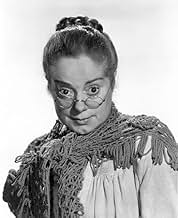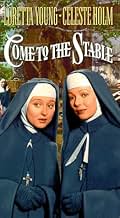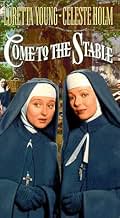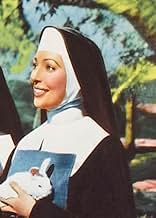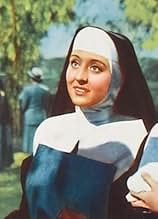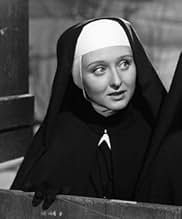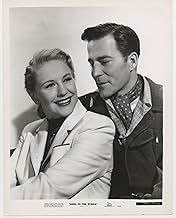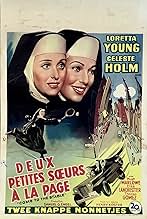AVALIAÇÃO DA IMDb
7,1/10
1,7 mil
SUA AVALIAÇÃO
Adicionar um enredo no seu idiomaTwo nuns arrive unannounced in the small New England town of Bethlehem, where they recruit various townspeople to help them build a children's hospital.Two nuns arrive unannounced in the small New England town of Bethlehem, where they recruit various townspeople to help them build a children's hospital.Two nuns arrive unannounced in the small New England town of Bethlehem, where they recruit various townspeople to help them build a children's hospital.
- Direção
- Roteiristas
- Artistas
- Indicado a 7 Oscars
- 5 vitórias e 9 indicações no total
Walter Baldwin
- Claude Jarman - Realtor
- (não creditado)
Pati Behrs
- Nun
- (não creditado)
John Bleifer
- Rosey - Rossi's Goon
- (não creditado)
Nan Boardman
- Nun
- (não creditado)
Wally Brown
- Howard Sheldon - Bob's Agent
- (não creditado)
Russ Clark
- Policeman
- (não creditado)
Louise Colombet
- Nun
- (não creditado)
Teddy Driver
- Cherub
- (não creditado)
- Direção
- Roteiristas
- Elenco e equipe completos
- Produção, bilheteria e muito mais no IMDbPro
Avaliações em destaque
Loretta Young and Celeste Holm are two nuns from a French convent on a mission to establish a children's hospital in a rural village much to the consternation of composer Robert Masen (Hugh Marlowe) who would like to see his place in the country stay just like it is. Against all odds the indomitable sisters move Masen and several other unlikely contributors into making the hospital a reality. It's fine family viewing with a warmth an innocence unseen in today's more cynical Christmas pics.
Come to the Stable (1949)
*** (out of 4)
Excellent performances and a touching story highlight this comedy/drama about a pair of nuns (Loretta Young, Celeste Holm) who travel from France to New England where they plan on building a children's hospital. Without any type of funds, the nuns try to gather enough money for their dream to come true but they're going to have to depend on some characters who aren't all that thrilled about the hospital. This film was nominated for seven Oscars but it seems to have been forgotten, which is a real shame because this is a pretty touching little gem that works on many levels. What really stands out are the terrific performances with Young and Holm both turning in strong work. There wasn't a single second that I ever looked at their characters and saw actors because the two were so good that you'll have no trouble believing that they are nuns. They're surrounding by some fine actors including Hugh Marlowe as a neighbor who doesn't want to church built. Elsa Lancaster plays an elderly, lonely woman who first takes the nuns in and Thomas Gomez is terrific as a gambler who owns the property where the sisters are wanting to build the hospital. The movie tries walking a fine line between laughs and drama and for the most part it works. I think there are a few bits that push too hard for comedy and you'll see one such scene early one when the "joke" about the nuns driving too fast is played to the extreme. The main reason this movie works is due to its more dramatic and religious moments. The film is never preachy nor does it try to convert people; instead it just makes you feel good. The sequence where the nuns go to the gambler to try and get him to give away the land ends is a very dramatic sequence that I won't ruin but it's incredibly touching. Another terrific scene is when the nuns try to get the local Bishop to buy into their ideas even though it seems impossible that they'll be able to pull them off. Apparently this drama was so successful when first released that a sequel was planned but never produced. It's easy to see why this movie would bring a crowd in but it deserves to be better known today.
*** (out of 4)
Excellent performances and a touching story highlight this comedy/drama about a pair of nuns (Loretta Young, Celeste Holm) who travel from France to New England where they plan on building a children's hospital. Without any type of funds, the nuns try to gather enough money for their dream to come true but they're going to have to depend on some characters who aren't all that thrilled about the hospital. This film was nominated for seven Oscars but it seems to have been forgotten, which is a real shame because this is a pretty touching little gem that works on many levels. What really stands out are the terrific performances with Young and Holm both turning in strong work. There wasn't a single second that I ever looked at their characters and saw actors because the two were so good that you'll have no trouble believing that they are nuns. They're surrounding by some fine actors including Hugh Marlowe as a neighbor who doesn't want to church built. Elsa Lancaster plays an elderly, lonely woman who first takes the nuns in and Thomas Gomez is terrific as a gambler who owns the property where the sisters are wanting to build the hospital. The movie tries walking a fine line between laughs and drama and for the most part it works. I think there are a few bits that push too hard for comedy and you'll see one such scene early one when the "joke" about the nuns driving too fast is played to the extreme. The main reason this movie works is due to its more dramatic and religious moments. The film is never preachy nor does it try to convert people; instead it just makes you feel good. The sequence where the nuns go to the gambler to try and get him to give away the land ends is a very dramatic sequence that I won't ruin but it's incredibly touching. Another terrific scene is when the nuns try to get the local Bishop to buy into their ideas even though it seems impossible that they'll be able to pull them off. Apparently this drama was so successful when first released that a sequel was planned but never produced. It's easy to see why this movie would bring a crowd in but it deserves to be better known today.
I saw this charming, slickly produced film as a young parochial grammar school kid at a theater in downtown Boston (near where my family lived at the time) and remember being tremendously amused at the scene where the two sisters, played by Loretta and Celeste (saddled with having to approximate a French accent), blithely tore up a parking ticket, placed on the windshield of their borrowed open WW II-era Jeep, thinking it was just an advertisement. Sister Celeste tosses the pieces into the air as they drive off from in front of New York's St. Patrick Cathedral where they'd illegally parked. (I doubt that she felt obliged to confess that little venial sin, do you?) There's a lot more to be amused and entertained by, of course, and the behind-the-camera artisans, as well as the well-chosen actors, especially Hugh Marlowe and Elsa Lanchester as well as Misses Young and Holm, all contributed some very professional work. Henry Koster, the director, was an old hand at keeping a project such as this from slipping entirely into a bath of over-the-top sentimentality.
So much has changed since those somewhat more innocent times and a gentle story such as this, with two ladies encased in those heavy, enveloping habits (with only their perfectly made-up faces visible to the world, by the way), is almost inconceivable today. See it and be transported back to a time when goodness, sincerity, and religious beliefs that don't descend into fanaticism were the order of the day, at least in Hollywood movies aimed at the family trade.
One interesting little tidbit: in one scene Hugh Marlowe's character (a song writer) sings the Academy Award-nominated song, "Through a Long and Sleepless Night" (which didn't win - and you'll hear why), and his singing voice was dubbed by Ken Darby, who was chiefly responsible for directing most of the choral work in many of Twentieth's films for many years. I have a suspicion that Mr. Darby probably rejected quite a few male candidates who wanted to join the Fox studio's choir if they didn't sound any better than he did!
So much has changed since those somewhat more innocent times and a gentle story such as this, with two ladies encased in those heavy, enveloping habits (with only their perfectly made-up faces visible to the world, by the way), is almost inconceivable today. See it and be transported back to a time when goodness, sincerity, and religious beliefs that don't descend into fanaticism were the order of the day, at least in Hollywood movies aimed at the family trade.
One interesting little tidbit: in one scene Hugh Marlowe's character (a song writer) sings the Academy Award-nominated song, "Through a Long and Sleepless Night" (which didn't win - and you'll hear why), and his singing voice was dubbed by Ken Darby, who was chiefly responsible for directing most of the choral work in many of Twentieth's films for many years. I have a suspicion that Mr. Darby probably rejected quite a few male candidates who wanted to join the Fox studio's choir if they didn't sound any better than he did!
10crash5
For some reason we bought this movie years ago. Every time I started to watch it I fell asleep before the end. It sat in storage for years and I took it out last week and FINALLY watched it from beginning to end. What a surprise! It's a heartwarming movie. It's definetly a period film, but it's not corny. I think I like the respect that God gets in the storyline. A 10 out of 10, just because!!
"An irresistible force has been let loose in New England" as two nuns travel across what appears to be desolate country by foot, coming upon a stable in the clearing...true, they're in Bethlehem, but it's Bethlehem, New York! The stable is being rented by a dotty artist who specializes in religious paintings, and the sisters have been drawn there by a picture-postcard with the hopes of spearheading development in that area for a children's hospital. Skillful sentiment walks a nimble line between heartfelt religiosity and treacle. The nuns (Loretta Young and Celeste Holm, both Oscar-nominated) lack just two things in their quest--land and money--and the ways in which they acquire these necessities will warm even the grumpiest of viewers (they melt the heart of Thomas Gomez's surly racketeer--luckily for the sisters, he's a Catholic!). No weighty or ponderous agendas here, just simple, old-fashioned entertainment. Beautifully photographed by Oscar-nominated Joseph LaShelle, with music direction by Lionel Newman that tugs at the tear ducts. *** from ****
Você sabia?
- CuriosidadesAccording to a TCM narrative, "Come to the Stable" is based on the founding of the Abbey of Regina Laudis in Bethlehem, Conn., which was founded in 1947 by Mother Benedict Duss, O.S.B. and Mother Mary Aline Trilles de Warren, O.S.B. of the Benedictine Abbey of Notre Dame de Jouarre in France. One-time Hollywood actress, Dolores Hart, entered the convent in 1963, later becoming Abbess. Partly because of her acting background, the abbey now sponsors annual summer theatre productions.
- Erros de gravaçãoWhen the nuns first leave the train station with Anthony in the jeep, it has chains on the rear wheels. When they arrive at Mrs. Potts' house, the chains are gone.
- Citações
Sister Margaret: It isn't hard to relinquish a dream if it's God's will. Yes?
- ConexõesFeatured in A Hollywood Christmas (1996)
- Trilhas sonorasThrough a Long and Sleepless Night
Music by Alfred Newman
Lyrics by Mack Gordon
Performed by Dorothy Patrick (dubbed by Eileen Wilson) (uncredited) and by Hugh Marlowe (dubbed by Ken Darby) (uncredited)
Principais escolhas
Faça login para avaliar e ver a lista de recomendações personalizadas
- How long is Come to the Stable?Fornecido pela Alexa
Detalhes
- Data de lançamento
- País de origem
- Idiomas
- Também conhecido como
- Hablan las campanas
- Locações de filme
- Empresa de produção
- Consulte mais créditos da empresa na IMDbPro
- Tempo de duração
- 1 h 34 min(94 min)
- Cor
- Proporção
- 1.37 : 1
Contribua para esta página
Sugerir uma alteração ou adicionar conteúdo ausente

